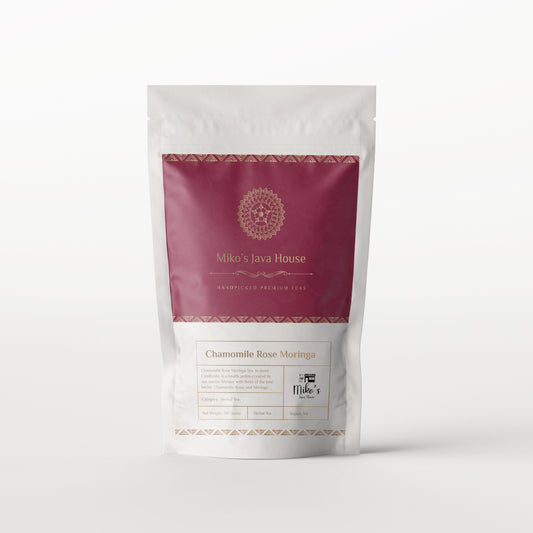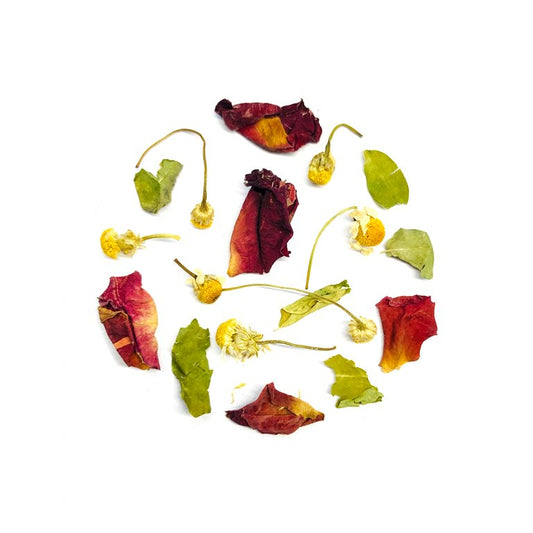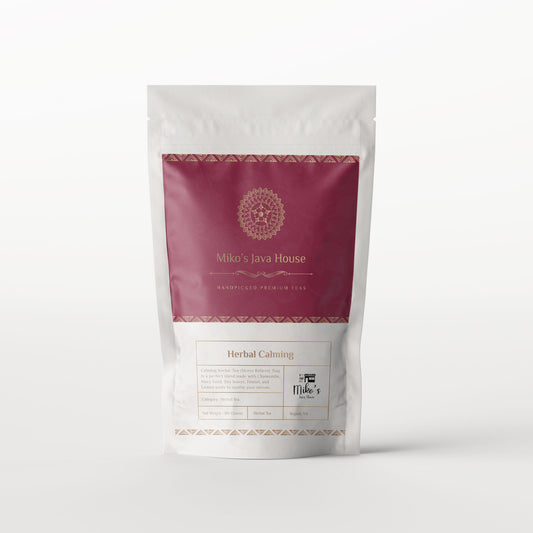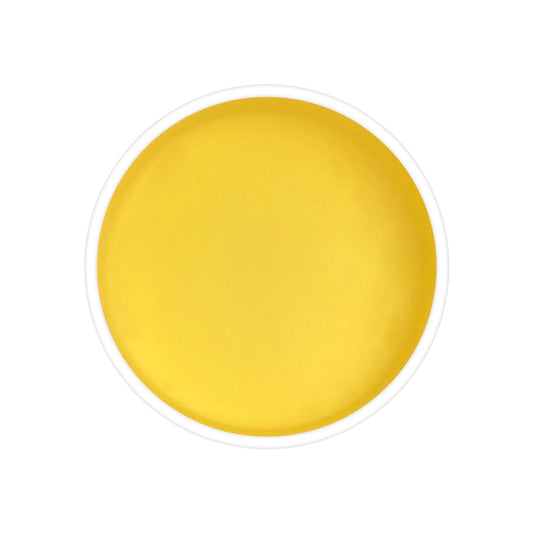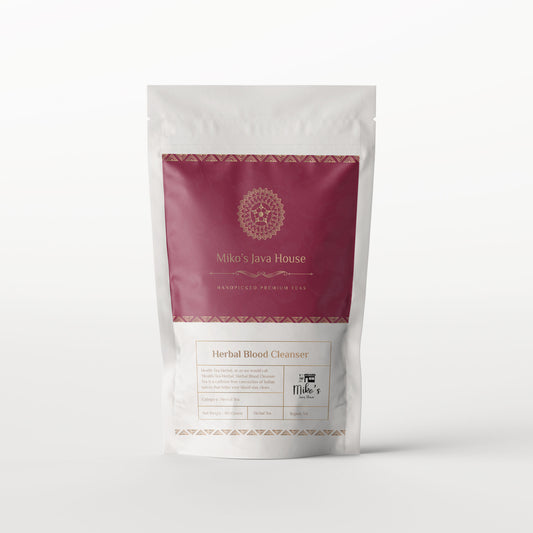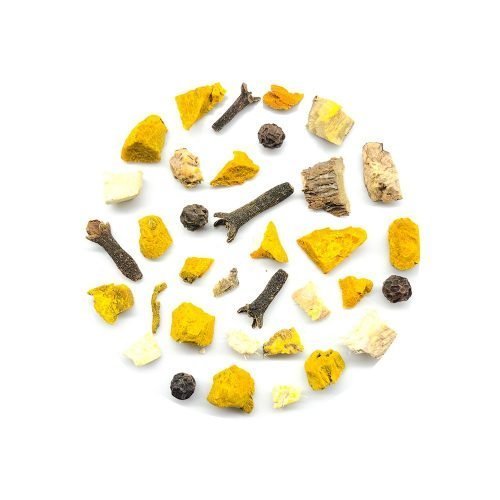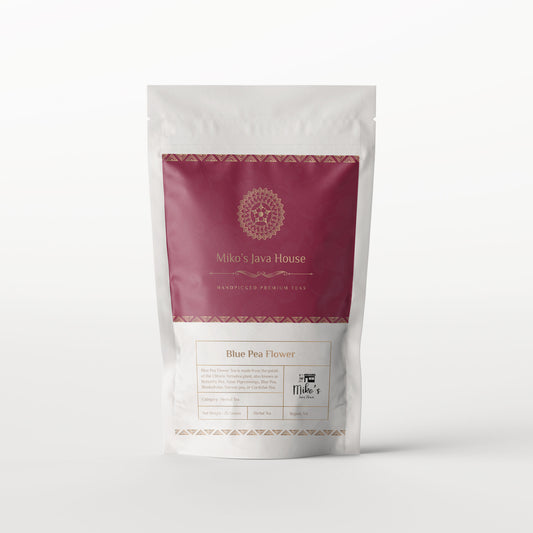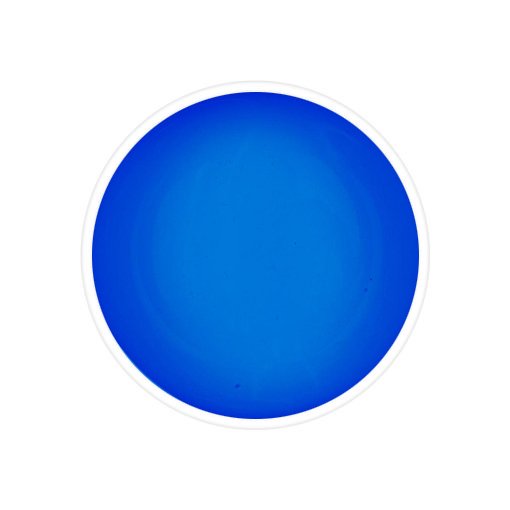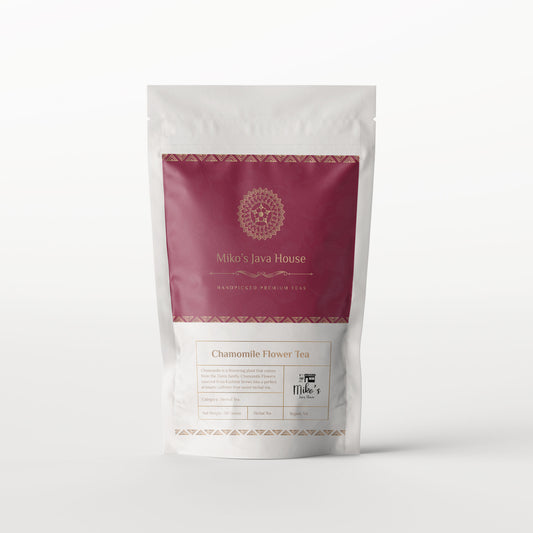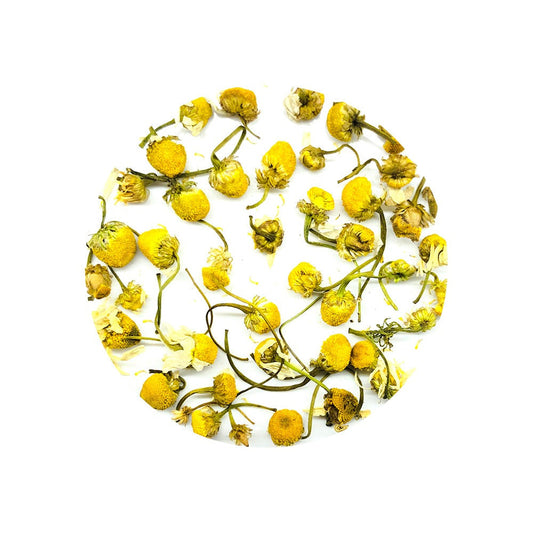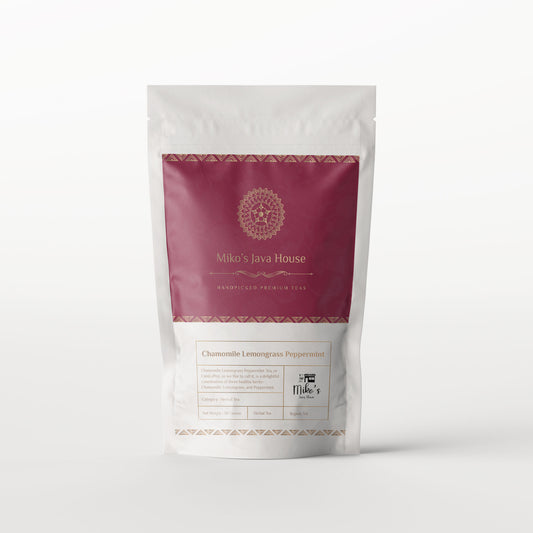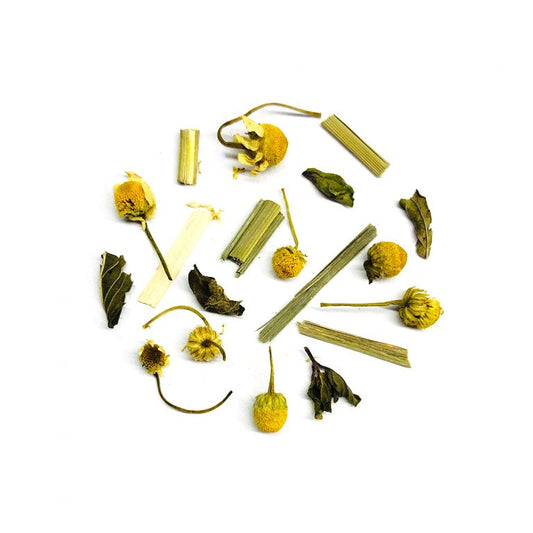Herbal Teas
Shop our herbal teas collection from calming chamomile to invigorating peppermint, our blends redefine your tea ritual. Elevate your senses with nature's healing power.
-
Chamomile Rose Moringa (CamRoMo)
Regular price $17.51USDRegular priceUnit price / per -
Herbal Calming Tea
Regular price $18.85USDRegular priceUnit price / per -
Herbal Blood Cleanser
Regular price $18.85USDRegular priceUnit price / per -
Blue Pea Flower Tea
Regular price $15.35USDRegular priceUnit price / per -
Chamomile Flower Tea
Regular price $15.99USDRegular priceUnit price / per -
Chamomile Lemongrass Peppermint (CamLePep)
Regular price $14.87USDRegular priceUnit price / per
Collapsible content
About Herbal Teas
Unveiling the World of Herbal Teas: A Caffeine-Free Adventure
Step into a world of soothing aromas, vibrant colors, and captivating flavors with herbal teas, also known as tisanes! Unlike their black and green tea cousins, herbal teas aren't derived from the Camellia sinensis plant. Instead, they're delightful infusions of various herbs, fruits, spices, and flowers, offering a caffeine-free and endlessly diverse beverage experience.
A Symphony of Benefits:
Herbal teas are more than just delicious; they boast a range of potential health benefits. Craving a relaxing moment after a long day? A cup of chamomile tea, renowned for its calming properties, might be your perfect companion [1]. Feeling a bit of digestive discomfort? Peppermint tea, with its refreshing menthol notes, could offer relief [2]. And that's just the beginning! From aiding sleep to supporting a healthy immune system, different herbal teas cater to various needs.
Who Should Embrace Herbal Teas?
Herbal teas are a fantastic option for anyone seeking a caffeine-free beverage. They're perfect for those who are sensitive to caffeine or simply prefer a relaxing evening cup. Health-conscious individuals can explore a world of natural ingredients, each with its unique properties. And for tea enthusiasts looking to expand their flavor horizons, herbal teas offer a delightful adventure beyond the realm of traditional black and green teas.
Ready to Dive In?
Whether you're seeking relaxation, a digestive aid, or simply a flavorful caffeine-free beverage, herbal teas have something to offer everyone. So, explore the vast world of herbal infusions, discover your new favorites, and embark on a journey of taste and potential wellness!
Herbal Teas: Unveiling a World Beyond the Leaf
The world of tea is vast and wonderful, offering a beverage for every mood and occasion. But there's a whole category that goes beyond the leaves of the Camellia sinensis plant: herbal teas, also known as tisanes! Let's delve into what makes herbal teas unique and explore the incredible diversity they offer.
Herbal vs. True Teas: A Distinction Worth Knowing
While both herbal teas and true teas (like black, green, or white) share the comforting ritual of steeping in hot water, there's a key difference in their origin. True teas come from the Camellia sinensis plant, with different processing methods creating variations like black or green tea. Herbal teas, on the other hand, are a much broader category. They can be infusions of:
- Herbs: Think soothing peppermint for digestion or calming chamomile for relaxation.
- Fruits: Imagine vibrant hibiscus for a tart and refreshing drink or luscious berries for a touch of sweetness.
- Spices: Warm up with a ginger infusion to soothe a sore throat or add a kick of cinnamon for a cozy flavor boost.
- Flowers: Delicate rose petals can add a touch of floral elegance, while hibiscus flowers create a beautiful ruby red brew.
A Universe of Flavor and Potential Benefits:
This incredible diversity of ingredients translates into a limitless world of flavor profiles. From the classic minty freshness of peppermint to the fruity sweetness of hibiscus, there's an herbal tea to suit every taste bud.
But the magic of herbal teas goes beyond just taste. Many herbs, fruits, and spices used in these infusions have been used for centuries in traditional wellness practices. Chamomile is known for its calming properties, while ginger can aid digestion. Of course, it's important to consult a doctor for any specific health concerns, but herbal teas offer a delicious way to explore potential natural wellness benefits.
So, the next time you reach for a cup of tea, consider venturing beyond the traditional leaves. The world of herbal teas awaits, brimming with flavor, comfort, and a touch of natural wellness!
Unveiling a World of Flavor and Wellness: Exploring Herbal Teas
Herbal teas, also known as tisanes, offer a captivating journey for your senses and well-being. Unlike traditional teas, they aren't derived from the Camellia sinensis plant, but rather an infusion of herbs, fruits, spices, and flowers. This translates into a delightful variety of flavors and potential health benefits waiting to be discovered. Let's delve into some popular categories of herbal teas and the unique experiences they offer:
- Stress-Relief Sanctuary: Feeling overwhelmed? Herbal teas can be your haven of relaxation. Look for blends featuring calming herbs like chamomile, known for its soothing properties. Lavender, with its floral aroma, can also contribute to a sense of tranquility. These calming infusions are perfect for unwinding after a long day.
- Digestive Delight: Does your stomach need a little TLC? Herbal teas come to the rescue! Peppermint tea is a classic choice, known for its ability to soothe digestion and ease occasional nausea. Ginger tea is another hero, with its warming properties that can aid digestion.
- Sleep Sanctuary: Struggling to catch those precious Zzz's? Herbal teas can help you drift off peacefully. Look for blends with chamomile, mentioned earlier for its relaxing properties. Valerian root is another popular ingredient in sleep-supportive teas, although it's important to consult your doctor before consuming it.
- Immunity Boosters: Looking for a natural way to support your immune system? Herbal teas can be your allies. Echinacea is a popular herb used in some blends, although research is ongoing about its effectiveness. Elderflower tea is another option, traditionally used for its potential immune-supportive properties. Remember, these teas are not a replacement for a healthy lifestyle, but can be a delightful addition to your wellness routine.
- Detox & Cleanse (Use with Caution): It's important to note that there's no scientific evidence to support the idea of detox teas or cleanses. However, some herbal teas can have a diuretic effect, encouraging urination. Consult your doctor before consuming these types of blends, especially if you have any underlying health conditions.
These are just a few examples of the vast and ever-evolving world of herbal teas. With a little exploration, you can discover blends that cater to your specific needs and preferences. So, grab your favorite mug, steep a cup of herbal tea, and embark on a flavorful journey to wellness!
Brewing Bliss: Unveiling the Simplicity of Herbal Teas
Herbal teas, also known as tisanes, offer a world of flavor and potential wellness benefits, all without a drop of caffeine. But brewing these delightful beverages couldn't be easier! Let's explore the simple steps to crafting the perfect cup of herbal tea, tailored to your taste.
Effortless Brewing:
The beauty of herbal teas lies in their ease of preparation. All you need is hot water, your favorite loose leaf blend or tea bag, and a moment of relaxation. Here's the basic process:
- Heat the Water: Bring fresh, filtered water to a boil. Using filtered water helps eliminate any unwanted flavors that might interfere with the delicate taste of your herbal tea.
- Steep the Tea: Pour the hot water over your chosen herbal tea. Most herbal teas thrive with a steeping time between 5-10 minutes, but always refer to the package instructions for specific recommendations. Some delicate herbs like chamomile might only need 3-5 minutes, while heartier ingredients like ginger can handle a longer steep.
- Strain and Enjoy: After steeping, strain the tea to remove the loose leaves or tea bag. Sit back, relax, and savor the delightful aroma and flavor of your creation!
Tips for a Perfect Cup:
While brewing is straightforward, a few simple tips can elevate your herbal tea experience:
- Follow the Package Instructions: Most herbal tea blends come with recommended steeping times and water temperatures. These guidelines are tailored to the specific ingredients to ensure the best flavor extraction.
- Embrace Filtered Water: Filtered water removes chlorine and other impurities that can affect the taste of your tea. This allows the true flavors of your herbal blend to shine.
- Strength is a Personal Choice: Do you prefer a stronger or milder cup? Adjust the steeping time accordingly. A longer steep will yield a more robust flavor, while a shorter steep provides a subtler experience.
- Temperature Matters: While most herbal teas do well with boiling water, some delicate flowers or fruits might benefit from slightly cooler water (around 180°F or 82°C) to prevent scorching and preserve their flavor.
Beyond the Basics:
For some herbal teas, especially those featuring fruit or floral ingredients, cold-steeping can be a delightful alternative. Simply add your tea blend to a pitcher of cold water and let it steep for several hours, ideally overnight. This method produces a refreshing, light-bodied tea perfect for hot summer days.
Ultimately, brewing herbal tea is a personal journey! Experiment with different steeping times, water temperatures, and even honey or natural sweeteners to find your perfect cup. So, grab your favorite herbal blend, embrace the simplicity, and embark on a world of flavor and wellness!
Herbal Teas: A Sip Towards Wellness
Herbal teas, also known as tisanes, offer a delightful world of flavors and potential health benefits. Unlike true teas (black, green, etc.), they don't contain caffeine and are made from a beautiful symphony of herbs, fruits, spices, and flowers. Let's explore how these soothing beverages can support your overall well-being!
A Natural Path to Relaxation:
Feeling stressed? Certain herbal teas might be your calming companions. Chamomile, with its delicate floral notes, is a classic choice known for its relaxation properties. Studies suggest it may promote better sleep and ease anxiety. Lavender, another popular stress-reliever, can be enjoyed on its own or blended with chamomile for a truly calming experience.
Soothing Digestion:
Herbal teas can also be your allies for digestive comfort. Peppermint tea, with its refreshing minty flavor, is a go-to for soothing occasional tummy troubles. Ginger tea, with its warming properties, may also help ease nausea and indigestion.
Enhancing Sleep Quality:
Looking to unwind before bedtime? Herbal teas like chamomile and lavender, mentioned earlier, can promote relaxation and potentially improve sleep quality. Additionally, valerian root tea is a popular option for those seeking natural sleep support. Remember, consistency is key – incorporating these teas into your nightly routine can make a difference.
A Note on Wellness:
It's important to remember that herbal teas are not a magic bullet or a replacement for medication. While they offer potential health benefits, consulting with your doctor is crucial, especially if you have any underlying health conditions or are taking medications.
Explore and Discover:
The world of herbal teas is vast and exciting! From invigorating morning blends to calming nighttime infusions, there's a perfect cup waiting for you. Experiment with different flavors and ingredients to discover what works best for your wellness journey. Remember, a steaming cup of herbal tea can be a simple yet delightful way to nurture your mind and body.
Herbal Teas vs. Caffeinated Teas: Choosing Your Perfect Cup
The world of tea offers a delightful range of options, from invigorating to calming. But with so many choices, navigating the caffeine content can be tricky. Let's explore the key differences between herbal teas and caffeinated teas, helping you find your perfect cup!
Herbal Teas: A Caffeine-Free Escape
Imagine curling up with a warm mug of chamomile tea, its soothing aroma enveloping you. Unlike black or green tea, herbal teas (also called tisanes) are naturally caffeine-free. These delightful infusions are created by steeping herbs, fruits, spices, or flowers in hot water. This caffeine-free quality makes them a perfect choice for relaxation before bed, a gentle way to soothe digestion after a meal, or simply a calming beverage throughout the day.
Caffeinated Teas: A Morning (or Afternoon) Pick-Me-Up
On the other hand, black tea, green tea, and other true teas derived from the Camellia sinensis plant contain varying amounts of caffeine. This natural stimulant provides an energy boost, making these teas a popular choice to jumpstart your morning or overcome an afternoon slump. Black tea generally has a higher caffeine content compared to green tea, offering a stronger pick-me-up effect.
Choosing Your Perfect Cup:
So, which tea is your ideal match? Here's a breakdown to guide you:
- Team "Relax & De-Stress": If you crave a calming and caffeine-free beverage, herbal teas are your perfect companion. Explore soothing chamomile, refreshing peppermint, or a delightful blend designed for stress relief.
- Team "Energy Boost": Do you need a morning pick-me-up or an afternoon energy surge? Black tea or green tea might be your champions. Black tea offers a more robust caffeine content, while green tea provides a gentler energy boost with additional health benefits.
Beyond the Basics:
Remember, this is just the beginning of your tea journey! Explore the vast world of herbal tea blends, where calming chamomile meets invigorating ginger, or discover flavored black teas like Earl Grey for a touch of citrusy bergamot. The possibilities are endless!
Ultimately, the best tea is the one you enjoy the most! Experiment with different types, steeping times, and temperatures to discover a world of flavor and function. So, grab your favorite mug, explore the world of tea, and find your perfect cup – caffeinated or not!

